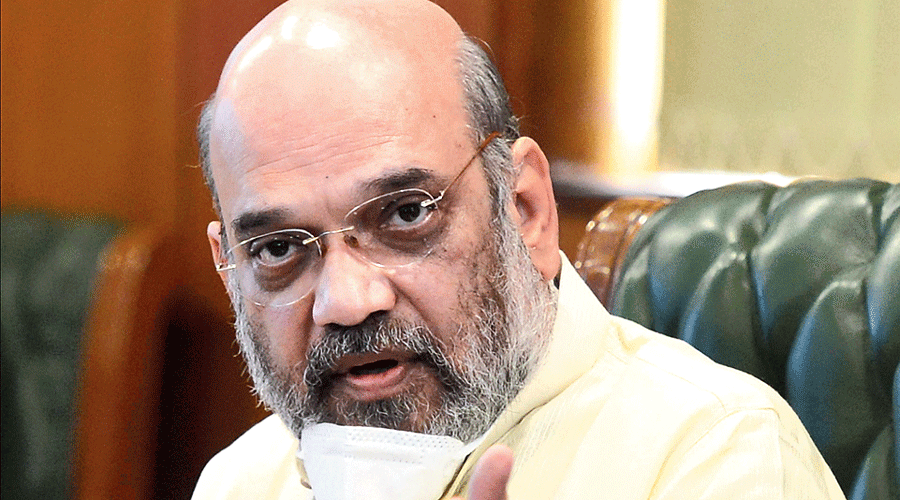The ministry of home affairs has asked states sharing an international border, especially the northeastern states, to keep a “close watch” on the demographic changes occurring in border areas and focus on the source of drugs instead of concentrating only on seizures.
The twin issues were flagged at the recently concluded two-day national security strategies conference held in Delhi, sources told The Telegraph.
Union home minister Amit Shah has instructed police chiefs of states sharing an international border with special reference to the northeast for keeping a close tab on the demographic changes occurring in the bordering areas, the sources said.
The message holds importance for the northeast which shares borders with China, Myanmar, Bangladesh, Bhutan and Nepal because few rebel groups are still active despite insurgency being reduced considerably over the past few years and the drug menace emerging as a “big challenge” in times to come, the sources said.
“All security agencies, therefore, have been told to work jointly to check the twin issues,” one of the sources said.
The issues discussed during the conference included counter-terror and counter-radicalisation, challenges of overground Maoists and Front organisation, cryptocurrency, counter-drone technology, watch on cyber and social media, security of ports and islands, emerging challenges of 5G technologies, demographic changes and increasing fundamentalism in bordering areas and smuggling of narcotics.
Northeastern states have seized a huge quantity of drugs as part of their ongoing war on drugs which mostly find their way to the region from Myanmar. Moreh (Manipur), Dimapur (Nagaland) and Karbi Anglong (Assam), among others, are said to be the routes used by the drug traffickers.
Last year, Assam chief minister Himanta Biswa Sarma said that the illegal trade business in Assam alone was around Rs 4,000 crore.
Most of the seized consignments in Assam are traced to Manipur, Mizoram and Nagaland, all of which share a border with Myanmar, sources said, adding the war against drugs has to continue.
Shah harped at the conference that seizing drug consignments would not be enough and the focus must be to “annihilate the entire drug network and to reach both its source and destination”.
The arrest of over 30 suspected jihadis in Assam this year has only fuelled apprehension about the radicalisation angle flagged by the meeting.
Most of them are suspected of having links with the banned Bangladesh terror outfit Ansarullah Bangla Team (ABT) of Bangladesh with Assam chief minister Himanta Biswa Sarma claiming it has been proved beyond reasonable doubt that Assam was “becoming a hotbed of Islamic fundamentalists” going by the busting of five modules in five months in the state. Four Assam districts share a border with Bangladesh.
The influx from Myanmar especially to Mizoram and Manipur since the coup in the neighbouring country is also a cause of worry.
This influx could lead to demographic changes leading to conflicts between locals and outsiders, in the long run, sources said.
Leading student organisations have already called for implementing the National Register of Citizens (NRC) for the entire region. As of now, only Assam has an updated NRC but that too has not yet been notified.
Shah, the sources said, asserted that the fundamental principle of modern intelligence should not be “need to know” but it should be “need to share” and “duty to share” because only a change in approach will ensure success.
The Union home minister also asserted at the conference that it was the “responsibility” of the state DGPs to ensure that all information of technological and strategic importance was “percolated down” the line, particularly in the bordering districts.
The conference was attended by ministers of state (home) Ajay Kumar Mishra and Nishith Pramanik, heads of central agencies, paramilitary forces and DGPs, among others.











